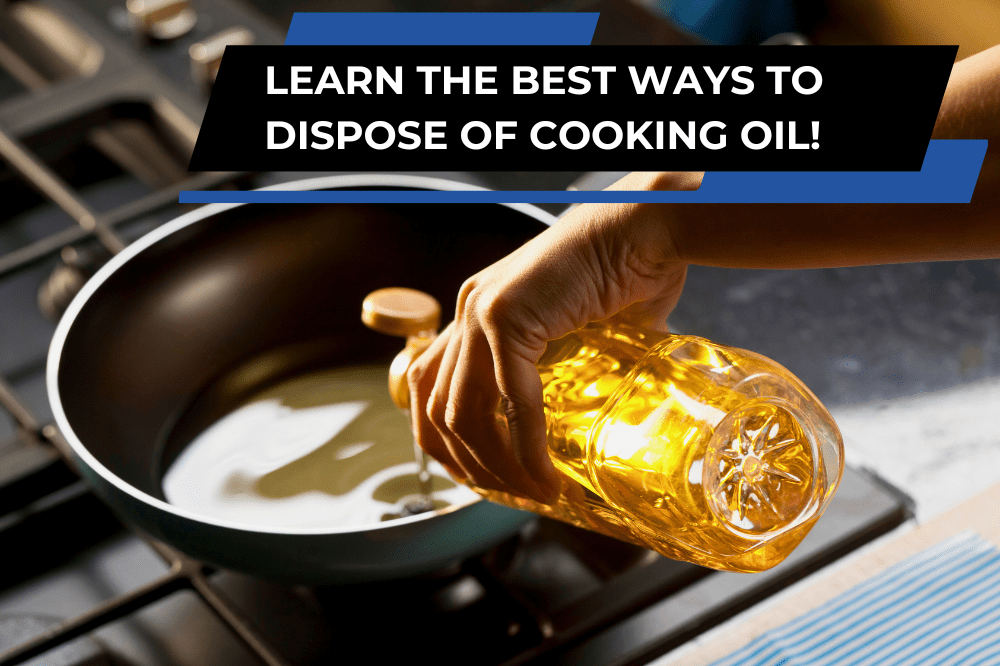Can I pour oil down the drain? If you’ve ever asked yourself this question, you’re not alone.
Many homeowners face the dilemma of disposing of used cooking oil. However, pouring oil down the drain can cause serious problems for your plumbing and the environment.
In this guide, we’ll explore why you should never pour oil down the drain and provide safe and practical alternatives for disposing of used cooking oil.
Understanding the Risks of Pouring Oil Down the Drain
What Happens When You Pour Oil Down the Drain?
When you pour oil down the drain, it doesn’t simply wash away. Instead, it cools and solidifies, forming stubborn blockages in your plumbing. These blockages can lead to:
- Slow drains
- Backups
- Burst pipes
These issues not only cause inconvenience but also result in costly repairs. The fats, oils, and grease (FOG) from cooking oil can cling to the insides of pipes, trapping other debris and creating severe blockages over time.
Environmental Consequences
The impact of pouring oil down the drain extends beyond your home. When oil enters the sewer system, it can cause significant environmental damage. Here’s how:
- Pollution: Oil can contaminate local waterways, harming aquatic life and disrupting ecosystems.
- Water Treatment Issues: Oil interferes with water treatment processes, making it harder to clean wastewater.
- Soil Contamination: Improper disposal can lead to soil contamination, affecting plant life and wildlife.
By understanding these consequences, it’s clear that responsible oil disposal is essential for both your home and the environment.
Expert Advice and Recommendations
Who Advises Against It?
Many experts strongly advise against pouring oil down the drain. This includes:
- Environment and Climate Change Canada (ECCC): The ECCC emphasizes the importance of proper disposal to prevent plumbing issues and environmental harm.
- Plumbing Professionals: Plumbers frequently encounter blockages caused by oil and warn homeowners about the dangers.
Who Handles the Aftermath?
When you pour oil down the drain, you might end up needing professional help.
Plumbers are often called to clear blockages caused by oil, which can be a time-consuming and expensive process.
Additionally, municipal workers must deal with the broader impacts on the sewer system, which can strain community resources.
Safe Disposal Methods
How to Safely Dispose of Used Cooking Oil
Proper disposal of used cooking oil is simpler than you might think. Here’s a step-by-step guide:
- Cool and Solidify: Let the oil cool and solidify. This makes it easier to handle and less likely to cause spills.
- Store in a Container: Scrape the solidified oil into a container with a lid, such as a disposable plastic or metal can.
- Dispose in the Trash: Once the container is full, dispose of it in your regular trash. Ensure the container is sealed to prevent leaks.
Where to Take Used Oil
For larger quantities of used oil, consider recycling. Many local facilities accept used cooking oil for recycling. Here’s how to find them:
- Local Recycling Centers: Check with your community’s waste management services for drop-off locations.
- Hazardous Waste Disposal Events: Many areas hold events specifically for disposing of hazardous materials, including cooking oil.
- Community Programs: Some communities offer curbside collection services for used oil. Check with your local government for more information.
Practical Tips for Homeowners
What to Do Instead
Instead of pouring oil down the sink, consider these alternatives:
- Reuse: Filter and reuse cooking oil for future cooking.
- Repurpose: Used oil can be repurposed for making soap or used in composting.
- Solidify and Dispose: Use absorbent materials like paper towels or cat litter to solidify small amounts of oil before disposing of them in the trash.
When to Call a Professional
If you suspect your plumbing is affected by oil, here are signs that it’s time to call a professional:
- Slow Drains: Persistent slow drainage could indicate a buildup of FOG in your pipes.
- Bad Odors: Foul smells emanating from your drains can signal a blockage.
- Water Backups: Water backing up in your sink or bathtub is a clear sign of a major blockage.
Regular plumbing maintenance can help prevent these issues from escalating. If you’re unsure, contact a reliable plumber for an inspection and maintenance.
Conclusion
Proper disposal of cooking oil is crucial for maintaining your plumbing and protecting the environment.
By following these tips, you can avoid costly repairs and contribute to a healthier ecosystem.
If you need assistance or more information, don’t hesitate to contact our plumbing services. We’re here to help you keep your home and community safe.
Expert Plumbing Solutions With True Service Plumbing
True Service Plumbing: Your Go-To Plumbing Experts in Toronto and the GTA
When it comes to maintaining a healthy plumbing system, True Service Plumbing is the trusted choice for both residential and commercial customers in Toronto and the GTA.
Our licensed professionals offer expert advice and efficient solutions for all your plumbing needs, from routine maintenance to emergency repairs.
Facing issues from oil down the drain? Let our skilled team diagnose and resolve the problem quickly and effectively, ensuring minimal disruption to your home or business.
Don’t let plumbing issues disrupt your peace of mind. Contact True Service Plumbing today. We’re here to keep your plumbing systems running smoothly and your environment protected.


